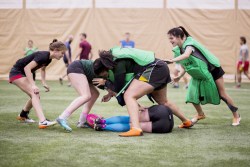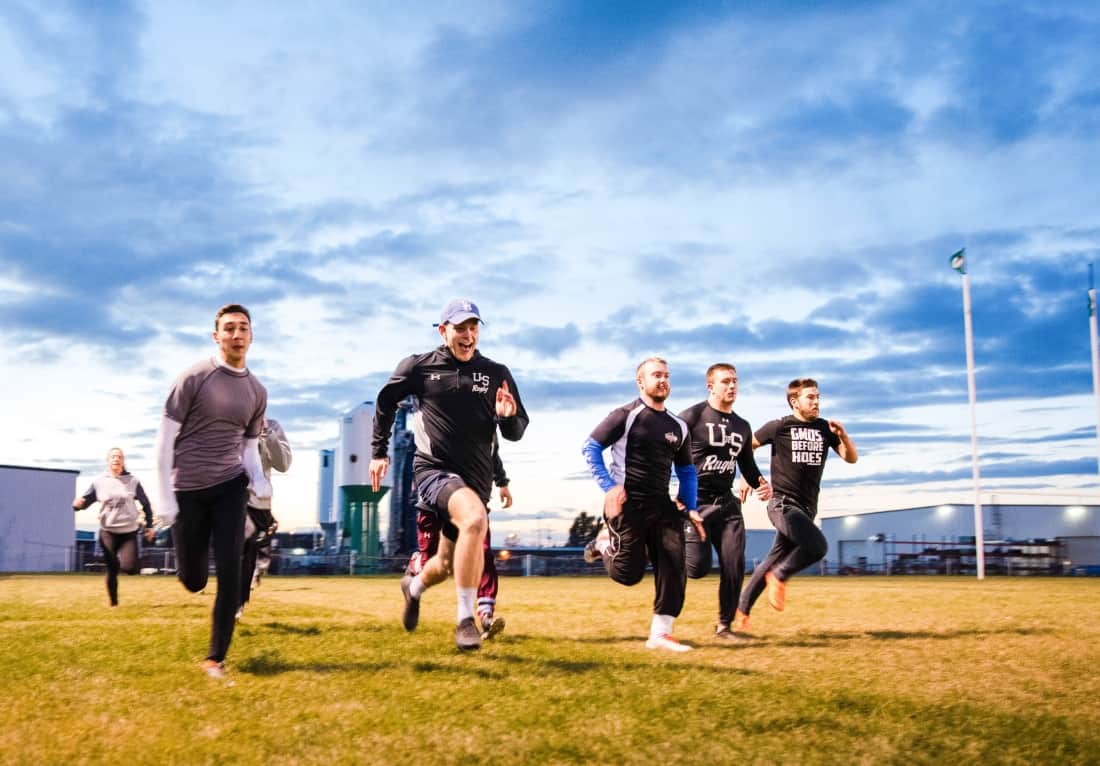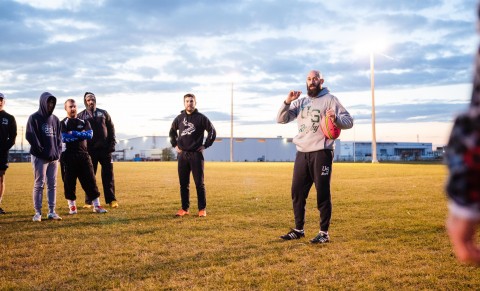
Players on the women’s team compete over the ball during practice. | Ashlynn Weisberg
Throughout the long history of Huskie Athletics, different sports have come and gone from the rosters, but the university currently does not host Huskies rugby. Straddling the line between non-Canada West student athletes and ratified Huskies, the University of Saskatchewan Rugby Club navigates a complex terrain.
The fast-paced, high-intensity sport found its way to the U of S in 2012, in the form of the U of S Rugby Club. Though, initially, the club consisted of only a men’s team, a women’s team was added in 2016.
Currently, U of S Rugby boasts over 50 registered members and accepts new athletes at any time, regardless of experience and skill. All U of S students are welcome, and the club also has a handful of Saskatchewan Polytechnic students as well as a few high school students as prospects.
Unfortunately, without varsity funding, the club functions on a pay-to-play basis — meaning that the athletes pay club dues, travel and accommodation for tournaments, tournament entry fees and facility fees for practice spaces. Uniforms are paid for by local sponsors, but the majority of fees are raised via regular fundraising efforts.
Mikayla Waller, in her first year of graduate studies in veterinary biomedical sciences, has been with the U of S Rugby Club for four years, serving as captain for three. Waller discusses the financial burden and the barriers that money can pose to athletes.
“Sometimes [fundraising] is a really big burden on the students, and sometimes the money is the reason why someone can’t play, and that just makes me really sad because rugby [doesn’t] need any equipment, so we want everyone to be able to play,” Waller said.

A U of S rugby player moves down the field with the ball on Oct. 3. | Riley Deacon / Photo Editor
In contrast, a lack of Huskie status provides U of S Rugby with an incredible amount of freedom and flexibility. With club status, all that are interested are welcome — which is a highly unique attribute for teams at the university level.
With regards to this distinct feature, Waller notes that, “as adults we don’t really get to try new things,” and because the club functions outside of contractual obligation, it is not only possible but encouraged to bring on beginners.
For Eryn Minifie, a newcomer to the club in her first year of animal bioscience, the communal aspect of the club serves as a grounding element in her transition from northern British Columbia to Saskatchewan.
“The rugby club here is so incredible — they are so inclusive… Everyone gets to play, and they make it fun for everyone,” Minifie said. “I was not hesitant at all to start. I actually wanted to play but didn’t know there was a team here… I showed up to a practice and am so thankful that I did.”
If the U of S Rugby Club was to become ratified with the Huskies, it would unfortunately lose a large portion of its inclusive core values due to an institutionalized increase in what is considered to be the baseline skill level required. Third-year mechanical engineering student Tom Stubbs, in his third year as captain, explained that this divide could be managed.
“I would like to think that, if we became Huskies, we would get more funding, and in that respect, we would become better at our sport and more competitive but also be able to maintain a separate club or an affiliated club … that does bring the newcomers on because I think it’s very important,” Stubbs said.

The U of S rugby team head coach instructs the team before practice on Oct. 3. | Riley Deacon / Photo Editor
Discussions with both the U of S Students’ Union and Huskie Athletics are ongoing, and Stubbs believes that the trajectory of the club is heading for Huskie ratification within a five-year period.
Isaac Driscoll, a third-year education student in his third year of playing for the club, hopes that, in gaining Huskie status, rugby will receive institutional legitimacy and validation as a sport.
“We are put in a unique spot. We want to represent the university, and ultimately do, but we are often neglected and viewed as non-existent,” Driscoll said.
With Huskie ratification years in the making, Driscoll offers his advice to the present student population.
“We like to have a good time together on the pitch and off the pitch, so even if you’re just looking for a community to be a part of, come out and play,” Driscoll said. “It’s well worth it.”
Whether you’ve played before or you’d never even heard of rugby until now, the U of S Rugby Club has a place for anyone and everyone. With the freedom of club status for now, there is no shortage of opportunities to get involved.
—
Ashlynn Weisberg
Photos: Ashlynn Weisberg, Riley Deacon / Photo Editor
Leave a Reply